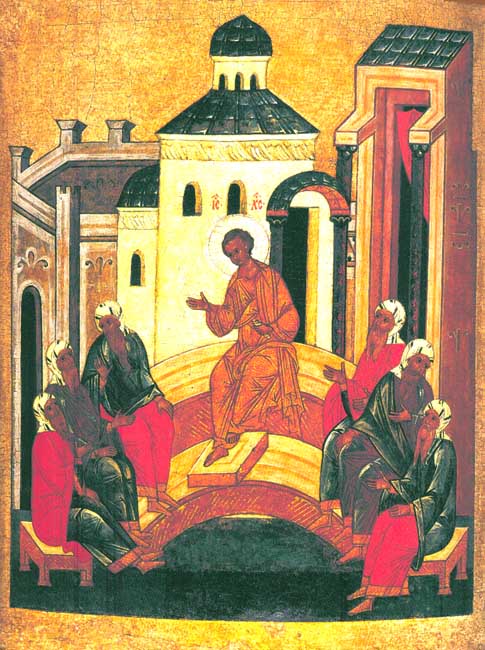 The Fathers of the Church teach that the names of God express and characterize His uncreated powers. Of course, they do not constitute the essence of God, since it is impossible to participate in anything other than His power. Every time God revealed Himself to the prophets, He revealed His attributes through His powers. Thus God is holy, righteous, immortal, loving, merciful, peaceful, and so on, because men have known Him in this way. St. Gregory of Nyssa teaches that by the names we attribute to God we understand what His work is and what the nature of this work is. In fact, it is generally believed that the Apostle Paul knew better than anyone else what Christ was, and he imitated Him in His purity, and Christ was formed in him. Because of this imitation of Christ, the nature of his soul was transformed into the first model. This is why he presents in his letters all the names of Christ. St. Gregory then lists the names of Christ, just as the Apostle Paul does. Christ is the wisdom and power of God, peace, unapproachable light, holiness, freedom, a great high priest, a Passover, the atonement of souls, the radiance of glory, the exact image of his person, the maker of generations, spiritual food and drink, rock and water, the foundation and cornerstone of faith, the image of the invisible God, a great God, the head of the body of the church, the firstborn of the new creation, the first fruits of those who have fallen asleep, the firstborn of the dead, the firstborn of many brothers, the mediator between God and man, the only begotten Son crowned with glory and honor, the Lord of glory and the origin of all creatures, and more…
The Fathers of the Church teach that the names of God express and characterize His uncreated powers. Of course, they do not constitute the essence of God, since it is impossible to participate in anything other than His power. Every time God revealed Himself to the prophets, He revealed His attributes through His powers. Thus God is holy, righteous, immortal, loving, merciful, peaceful, and so on, because men have known Him in this way. St. Gregory of Nyssa teaches that by the names we attribute to God we understand what His work is and what the nature of this work is. In fact, it is generally believed that the Apostle Paul knew better than anyone else what Christ was, and he imitated Him in His purity, and Christ was formed in him. Because of this imitation of Christ, the nature of his soul was transformed into the first model. This is why he presents in his letters all the names of Christ. St. Gregory then lists the names of Christ, just as the Apostle Paul does. Christ is the wisdom and power of God, peace, unapproachable light, holiness, freedom, a great high priest, a Passover, the atonement of souls, the radiance of glory, the exact image of his person, the maker of generations, spiritual food and drink, rock and water, the foundation and cornerstone of faith, the image of the invisible God, a great God, the head of the body of the church, the firstborn of the new creation, the first fruits of those who have fallen asleep, the firstborn of the dead, the firstborn of many brothers, the mediator between God and man, the only begotten Son crowned with glory and honor, the Lord of glory and the origin of all creatures, and more…
Since in this chapter we are specifically considering that the Son and Word of God is the Wisdom of God, we will summarize what St. Gregory of Nyssa says specifically about this name. God created all creatures. Since the Word is both Wisdom and Power, Wisdom is connected with Power. If Wisdom had not conceived creation, and if the Power by which thoughts are transformed into deeds had not followed Wisdom, we would not have these great and ineffable wonders in nature. Thus, when we see the significance of the composition of created things, we understand the ineffable power of the Word, and when we think of the creation of beings out of nothing, we fall down before the mysterious Wisdom of the Creator.
Believing that Christ is wisdom and power helps us to attain goodness. For what a person evokes in his prayer and what he sees with his own eyes, he attains through prayer. When he looks to Christ as power, he attains greater power in his inner world, and he who evokes the wisdom of God becomes wise. What St. Gregory means by this is that whoever prays to Christ as the wisdom and power of God shares with God a common name, that is, he becomes strong and wise and attains the perfection of life because with wisdom he chooses goodness and with power he succeeds in his choice.
It is therefore very necessary that we pray to Christ by different names, but that we seek to imitate Christ in what the names mean, for in this way, that is, by participation, we attain the essence of God. And since the names of Christ are His powers, it means that by praying to Him by the names we obtain His powers.


